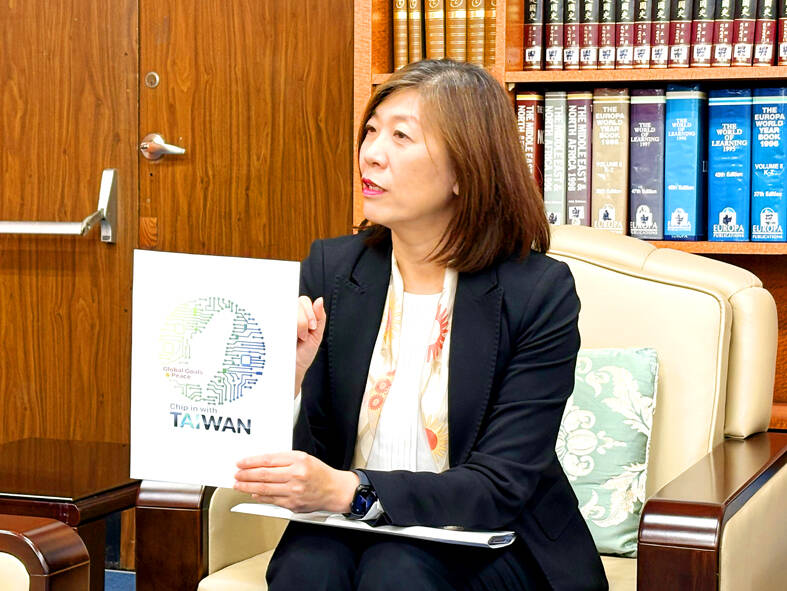A documentary on Taiwan’s “irreplaceable role” in semiconductors and artificial intelligence (AI) coproduced with the Discovery Channel is to premiere in spring, the Ministry of Foreign Affairs said yesterday.
Catherine Hsu (徐詠梅), director-general of the ministry’s Department of International Information Services, said that a teaser of Taiwan: An AI Island was broadcast by the Discovery Channel on Friday and yesterday.
The documentary tells the story of the nation’s “irreplaceable role” in the global semiconductor and AI supply chains and is expected to premiere in March or April, Hsu said.

Photo: Huang Chin-hsuan, Taipei Times
The program would be broadcast on the Discovery Channel in more than 20 Asian countries, including Japan, South Korea and India, and would subsequently be available for a global audience through Discovery’s YouTube channel, Hsu said.
The documentary would premiere in the lead-up to Computex Taipei in June to promote one of the largest computer and technology trade shows in the world, she added.
The ministry has been working with Discovery Channel since 2003 to produce documentaries to showcase Taiwan’s soft power and technological prowess to millions of viewers around the globe, Hsu said.
In the previous two years, the ministry and the Discovery Channel have produced two shows — Food Masters: Taste of Taiwan, which promoted Taiwan’s food culture and culinary tradition, and Taiwan Revealed: Smart Machinery, which showcased Taiwan’s manufacturing and machinery innovations.

The Chinese military has built landing bridge ships designed to expand its amphibious options for a potential assault on Taiwan, but their combat effectiveness is limited due to their high vulnerability, a defense expert said in an analysis published on Monday. Shen Ming-shih (沈明室), a research fellow at the Institute for National Defense and Security Research, said that the deployment of such vessels as part of the Chinese People’s Liberation Army (PLA) Navy’s East Sea Fleet signals a strong focus on Taiwan. However, the ships are highly vulnerable to precision strikes, which means they could be destroyed before they achieve their intended

The Taiwan Experience Education Program (TEEP) has funded short-term internships in Taiwan for more than 4,500 young people from more than 40 countries since 2015, with the goal of attracting and retaining international talent, the Ministry of Education said yesterday. Fifty-five colleges launched 514 projects this year, including in fields such as semiconductors, artificial intelligence, medicine and biotechnology, green energy, and sustainability, it said. The program provides research and practical internships in Taiwan for two to six months, and offers cultural exchange and networking opportunities, the ministry said. For example, National Formosa University’s Embedded System and Autopilot Laboratory developed two solar-powered drones in

GLOBAL: Although Matsu has limited capacity for large numbers of domestic tourists, it would be a great high-end destination for international travelers, an official said Lienchiang County’s (Matsu) unique landscape and Cold War history give it great potential to be marketed as a destination for international travelers, Tourism Administration Director General Chen Yu-hsiu (陳玉秀) said at the weekend. Tourism officials traveled to the outlying island for the Matsu Biennial, an art festival that started on Friday to celebrate Matsu’s culture, history and landscape. Travelers to Matsu, which lies about 190km northwest of Taipei, must fly or take the state-run New Taima passenger ship. However, flights are often canceled during fog season from April to June. Chen spoke about her vision to promote Matsu as a tourist attraction in

Taipei resident Mu Chu-hua caught some glimpses of China’s mighty military parade on YouTube on Wednesday. As she watched hypersonic missiles roll down Beijing’s Changan Avenue and troops march in lockstep, she did not feel like they posed a threat to Taiwan. Mu, a 69-year-old retiree, said she saw the parade as simply a way for Chinese President Xi Jinping (習近平) to “say thank you to the troops.” “I thought it was quite normal,” she said. “It was very cool.” China’s military parade commemorating the end of World War II was being watched internationally for insights into Beijing’s military advances and its show